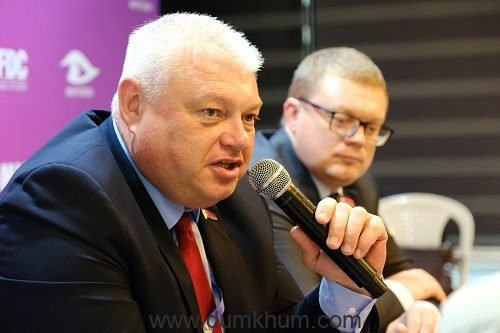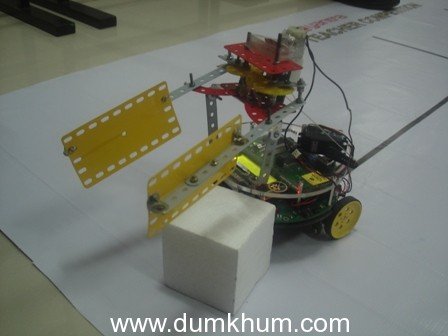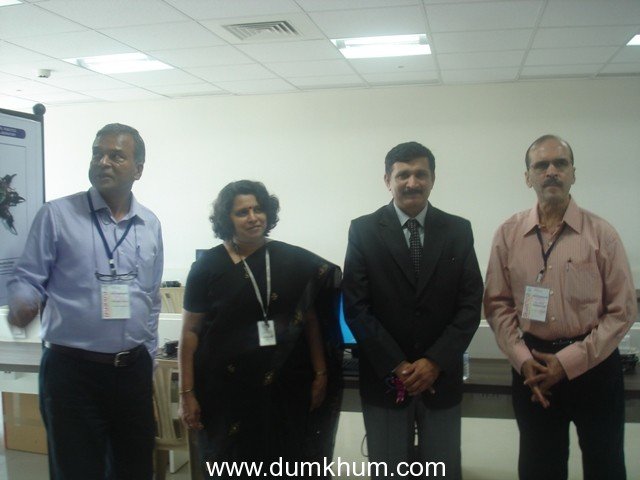IIT Bombay launches e-Yantra Lab Set-up Initiative
– A nationwide vision to enable and empower by creating facilities and producing mentors
– 5 nodal centres, 100 colleges by the end of 1st year and 25 nodal centres and 500 colleges by the end of 3 years
Mumbai, IT Bombay today announced the launch of its e-Yantra Lab Set-up Initiative (eLSI) – a nationwide vision to enable and empower engineering education in the country through creating facilities and producing mentors. A logical next step to providing scalability and sustainability to the pan-India e-Yantra Robotics Competition for students launched in July last year, e-Yantra Lab Set-up Initiative will create the infrastructure for students to engage their interest in Robotics and Embedded systems in a continuing manner. E-Yantra is an MHRD sponsored project under the National Mission for Education in ICT (NMEICT) program.
‘We do this by setting up e-Yantra labs, training teachers and getting them to integrate our “learn by doing” ideas into the curriculum. Once the labs are in place we can share our know-how, teaching insights, project methodologies, etc. ultimately to train the teachers to take ownership of our Embedded Systems course,’ says Prof. Kavi Arya of the Computer Science and Engineering department of IIT Bombay and one of the conceptualisers of e-Yantra.
In the pilot phase, e-Yantra conducted workshops where teams of 4 teachers from the shortlisted 16 engineering colleges in the Mumbai region were trained in the theory of micro-controllers and programming of Robots. To give them a hands on experience, these 16 teams participated in the e-Yantra Robotics Teacher Competition – a competition over a period of 4 months to train them in all aspects of a technology project. The finale of this teachers’ competition also coincided with today’s launch of eLSI as a symbol of preparedness of the teachers to assign projects to their students in the newly launched Robotics labs.
Photo Caption: (L to R) Prof. Kavi Arya of the Computer Science and Engineering department of IIT Bombay, Dr. Seema Shah , Acting Principal of Vidyalankar Institute of Technology, Prof Srikant Velankar from Vidyalankar Institute of Technology , Prof. Krithi Ramamritham from the CSE department and Co-conceptualiser of e-Yantra.
Today’s launch event took place at the Vidyalankar Institute of Technology, Wadala – one of the 16 participating colleges from Mumbai. The entire team of teachers and principals from the remaining 15 colleges were present at the launch along with the team from IIT Bombay including Prof. Krithi Ramamritham, Prof. Kavi Arya and also Dr. Rajan Welukar Vice Chancellor of Mumbai University who joined in through a video link to address the audience.
By the end of first year, IIT Bombay aims to create e-Yantra labs across 100 colleges and 5 Nodal Centers (each Nodal Center (NC) to oversee around 20 colleges). By the end of 3rd year this number would go up to 500 colleges and 25 NCs in all the small and large towns, villages and cities of the country.
A couple of weeks ago IIT Bombay’s e-Yantra concluded its first National Robotics Competition grand finale. First a phenomenon and then a rage among engineering students from across the nation; it led to 6000 registrations (from some of the remotest parts of the country), 500 participants, 25% female participants, 131 teams, 20 finalist teams and all winners.
While that created awareness and identified a need, in order to sustain the generated impact on the engineering curriculum in future, it was essential to create a supporting infrastructure that enables and empowers. An infrastructure that brings students and teachers together to work on innovative and meaningful projects and solves problems, which are unique to our country and environment.
Prof. Suresh Ukarande, Dean of Faculty of Technology, University of Mumbai who enthusiastically put Mumbai University behind this initiative and piloted and supported the e-Yantra Lab Setup Initiative said, ‘through Robotics, we want to create a culture of practical knowledge, research and creative and innovative thinking among students’.
‘What makes e-Yantra special is its inter-disciplinary approach. This results students across departments – be it electrical, mechanical, computer science – to come together to solve an existing tangible problem and create something that is beyond their defined syllabus. The e-Yantra Lab Setup Initiative is a visionary concept that only an institute of the stature of IIT Bombay can think of and see through. I wish them all the best,’ he added.
Speaking on the occasion, Prof. Krithi Ramamritham also from the CSE department and co-conceptualiser of e-Yantra said, ‘our goal is to help develop core engineering skills in our students to inspire them to look upon themselves as “problem solvers for society.” To stimulate their creativity and analytical skills and to “learn by doing.” This practical approach is sadly lacking in Indian education’.
‘We believe e-Yantra will play a significant role in addressing a number of the pressing issues in our education system at the college level. We need to scale up the program as fast as possible to create useful skills in the students. This means not only technology development but to nurture a market driven eco-system that will sustain the new infrastructure being created of robots and ancillary equipment in the academic community. This being our goal, we have certainly made a promising start and the story promises to get more exciting as we reach out to the rest of the country to colour it in different hues of e-Yantra,’ added Prof. Arya.
Commenting on the launch, Dr. Seema Shah, Acting Principal of Vidyalankar Institute of Technology said, ‘We at Vidyalankar Institute of Technology are extremely proud to be a part of the e-Yantra MHRD pilot project. Under the able guidance of the capable e-Yantra team from IIT Bombay, all the 16 colleges in Mumbai will definitely take this project to greater heights. This is just the start of a productive relationship among us all in the field of Robotics. The success of the pilot initiative will enable the e-Yantra team to extend this project to the other engineering colleges across the country’.
The IIT Bombay e-Yantra team has devised a simple, scalable and sustainable model for setting up labs in colleges across India. Colleges with strong networking and infrastructure capabilities in different regions are identified as Nodal Centers (NCs) each of which will serve as a coordinating and mentoring entity for 20-30 colleges from that region. All that the participating college needs to do is make an investment of Rs. 5 lakh to purchase robots, tools and ancillary equipment, have a dedicated team of 4 teachers (to be trained by IIT Bombay), physical space for the e-Yantra lab and 20 PCs/laptops to be made available to the students.
Once the infrastructure and willingness is in place, IIT Bombay steps in with its 3-pronged approach of setting up the e-Yantra labs that most teachers and colleges have found motivating and rewarding:
– Mentors: delivering mentors by training teachers through workshops on Robotics and Embedded systems
– Infrastructure: helping in infrastructure set up with its expertise and knowledge of setting up and running a Robotics lab
– Competition: leading the teachers through their participation in a teachers’ version of the contest to show how to handle a project.
Every college has the responsibility to create and sustain the interest of students in their engineering subjects. e-Yantra does this by making teaching exciting and demonstrating the societal problem-solving angle at every stage. A college gains highly motivated students and teachers and a relevant curriculum. It gains visibility amongst students. It creates students with the practical systems engineering outlook much more desirable to industry and the community. It creates value all round for all stakeholders.
By plugging the college into the IIT Bombay eco-system of projects and project ideas, e-Yantra’s intention and goal is to give each college a start such that over a period of time they also help create content for the robotic eco-system with a multiplicative effect on intellectual property creation.
About e-Yantra
Brainchild of two of IIT Bombay’s open source evangelists and veteran professors in embedded systems, professors Kavi Arya and Krithi Ramamritham, e-Yantra is an MHRD sponsored project under the National Mission for Education in ICT (NMEICT) program. e-Yantra aims to provide training to engineering teachers and students across India with limited access to labs and mentors. It does this by helping colleges to set up labs and clubs so that innovative technology is not shackled by lack of infrastructure. As a result, students imbibe engineering principles in a fun way and minds are engaged in the application of math and computer science to everyday problems.
Approach:
– Make robotics accessible to undergraduate students from engineering colleges across disciplines, especially those who do not have access to facilities and/or mentors.
– Cultivate qualities in students that makes them better engineers – and to make it fun to build embedded systems. The modus operandi is to provide hands-on learning-infrastructure to engineering students with limited access to labs and mentors.
– Create a practical outlook by articulating problems students see around themselves and to solve them in the small using a robot developed by the IIT-Bombay team.
– Harness the power of open source to draw upon to model a sophisticated solution to a problem.
About IIT Bombay
IIT Bombay, the second IIT to be set up in 1958, is recognised worldwide as a leader in the field of engineering education and research. It is reputed for the quality of its faculty and the outstanding calibre of students graduating from its undergraduate and postgraduate programmes. The institute has a total of 14 academic departments, six centres, one school and three Interdisciplinary programmes. Over the last five ecades, more than 39,000 engineersand scientists have graduated from the institute. It is served by more than 552 faculty members considered not only amongst the best within the country, but are also highly recognised in the world for achievements in the field of education and research. Nine Shanti Swaroop Bhatnagar awardees, 35 INAE (Indian National Academy of Engineering) awardees, five INAE Young Engineer awardees, 18 INSA (Indian National Science Academy) awardees, one Young Scientist awardee, 25 NASI (National Academy of Sciences, India) awardees, 20 IAS (Indian Academy of Sciences) awardees and seven Swarnajayanti fellows are currently or have previously been affiliated with the institute. Today the Institute is recognized as one of the centres of academic excellence in the country. Over the years, there has been dynamic progress at IIT Bombay in both academic and research activities, including a parallel improvement in facilities and infrastructure to keep it on par with the best institutions in the world.









